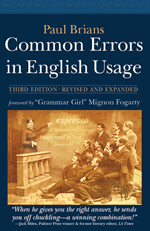Colons have a host of uses, but they mostly have in common that the colon acts to connect what precedes it with what follows. Think of the two dots of a colon as if they were stretched out to form an equal sign, so that you get cases like this: “he provided all the ingredients: sugar, flour, butter, and vanilla.” There are a few exceptions to this pattern, however. One unusual use of colons is in between the chapter and verses of a Biblical citation, for instance, “Matthew 6:5.” In bibliographic citation a colon separates the city from the publisher: “New York: New Directions, 1979.” It also separates minutes from hours in times of day when given in figures: “8:35.”
It is incorrect to substitute a semicolon in any of these cases. Think of the semicolon as erecting a little barrier with that dug-in comma under the dot; semicolons always imply separation rather than connection. A sentence made up of two distinct parts whose separation needs to be emphasized may do so with a semicolon: “Mary moved to Seattle; she was sick of getting sunburned in Los Angeles.” When a compound sentence contains commas within one or more of its clauses, you have to escalate to a semicolon to separate the clauses themselves: “It was a mild, deliciously warm spring day; and Mary decided to walk to the fair.” The other main use of semicolons is to separate one series of items from another—a series within a series, if you will: “The issues discussed by the board of directors were many: the loud, acrimonious complaints of the stockholders; the abrupt, devastating departure of the director; and the startling, humiliating discovery that he had absconded with half the company’s assets.” Any time the phrases which make up a series contain commas, for whatever reason, they need to be separated by semicolons.
Many people are so terrified of making the wrong choice that they try to avoid colons and semicolons altogether; but formal writing often requires their use, and it’s wise for serious writers to learn the correct patterns.
Back to list of errors

BUY THE BOOK!
